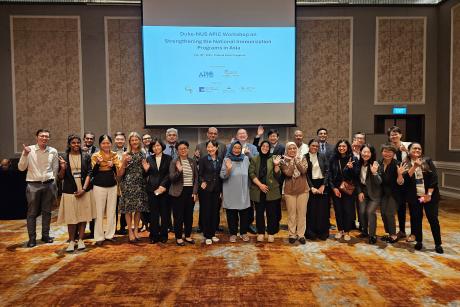
DGHI and Duke Kunshan University professor Shenglan Tang presents at a Dec. 4 symposium sponsored by DKU's VaxLab.
Published December 18, 2024, last updated on December 19, 2024 under Partnerships
Nearly 100 researchers and policymakers from across Southeast Asia convened in Beijing on Dec. 4 to discuss strategies for expanding and strengthening national immunization programs across the region.
The event, co-hosted by the Innovation Lab for Vaccine Delivery Research (VaxLab) at Duke Kunshan University and the China International Knowledge on Development Center (CIKD), marked the 50th anniversary of the "Global Expanded Program on Immunization" (EPI), an initiative launched by the World Health Organization in 1974 to advance equitable access to vaccines for preventable diseases. EPI is credited for significanly reducing childhood mortality by making routine immunizations for diseases such as polio, measles and tuberculosis more widely available across the world.
In Beijing, conference attendees focused on how to continue that progress, discussing challenges in achieving universal vaccine coverage, implementing equitable immunization systems, and introducing new vaccines to national immunization programs.
The symposium theme echoed the mission of VaxLab, which was established in 2021 at Duke Kunshan University with the support of the Bill & Melinda Gates Foundation. The effort is led by Shenglan Tang, M.D., Ph.D., a global health professor who holds appointments at both Duke Kunshan University and the Duke Global Health Institute. DGHI also supports a technical assistance hub for VaxLab and provides expertise for its research and advocacy work.
The event brought together representatives from six countries, including Australia, Singapore, Indonesia, Sri Lanka and Malaysia, as well as attendees from international organizations, government and leading research institutions.
In a keynote speech, Tang offered a comparative analysis of the national immunization programs in 13 Asian countries, emphasizing the critical obstacles in financing, governance, service delivery and surveillance systems that have delayed the introduction of WHO-recommended vaccines. He called for increased support from international organizations to ensure access to vaccines for middle-income countries.
A panel discussion led by Professor Ren Minghui of Peking University focused on tackling barriers faced by middle-income countries in achieving universal vaccine coverage. Participants agreed on the need for multi-sectoral cooperation and innovative financing to expand access to immunization services.
Other prominent speakers at the event included Dr. Adriana Jimenez Cuen of Gavi, Professor Kristine Macartney of the Australian National Centre for Immunization Research and Surveillance (NCIRS), and Dr. Sri Rezeki Hadinegoro from the Indonesia Technical Advisory Group for Immunization. The symposium also included presentations from experts with the CIKD, the National Disease Control and Prevention Administration (NDCPA) and the Bill & Melinda Gates Foundation, as well as country-level insights on the implementation of national vaccine strategies.
Experts from Singapore, Sri Lanka, Indonesia and Malaysia shared successes and challenges in introducing new vaccines, evidence-based policymaking, and enhancing the implementation of immunization programs. China’s introduction of the hepatitis B vaccine into its national immunization program and pilots to expand access to HPV vaccines were also highlighted.
The symposium concluded with in-depth discussions on optimizing China’s immunization strategies and expanding global partnerships to strengthen immunization systems in Asia.
For more information on the symposium, visit the VaxLab's report from the event.


